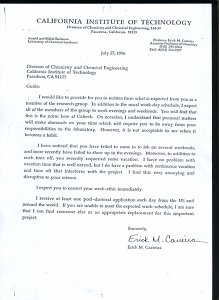 I hope things have changed a little since the bad old days when professors suggested that members of their research team ought to work all day, every day, including evenings and weekends, public holidays and could only have time off for a vacation if it had been well earned. It’s possible that an original letter reproduced a while  back was actually meant tongue-in-cheek, it’s hard to say but the letter sent to “Guido” lit a fire under the science work ethic debate.
I hope things have changed a little since the bad old days when professors suggested that members of their research team ought to work all day, every day, including evenings and weekends, public holidays and could only have time off for a vacation if it had been well earned. It’s possible that an original letter reproduced a while  back was actually meant tongue-in-cheek, it’s hard to say but the letter sent to “Guido” lit a fire under the science work ethic debate.
Leaders in their field perhaps have every right to insist that their charges work as hard as they do. Was the letter, which told Guido: “In addition to the usual work-day schedule, I expect all of the members of the group to work evenings and weekends,” entirely serious? We may never know.
Interesting, that the notorious letter should come up again this week, given that once again the risks of working more than 40 hours a week has yet again surfaced in the media. It’s nonsense, of course, the notion of burning the candle at both ends is entirely relative, some people thrive on long hours, working weekends and never take a vacation. Others prefer an easy life, tipping the work-life balance in the opposite direction. But, who achieves the most in terms of life satisfaction?
More to the point, who was Guido? Did he stay in chemistry? Did he do well and does he still avoid working weekends? Well, the recipient of that infamous missive dated 1976 was allegedly none other than Guido Koch, Director in Global Discovery Chemistry Basel at the pharmaceutical giant Novartis. I suspect he worked quite hard to get to that position, whether or not that was down to the allegedly draconian rules on working hours or because he skipped weekends we may never know. Apparently, the letter’s author and Koch are still very much on speaking terms.